Charles E.W. Bean, Diaries, AWM38 3DRL 606/52/1 July 1916 pt2
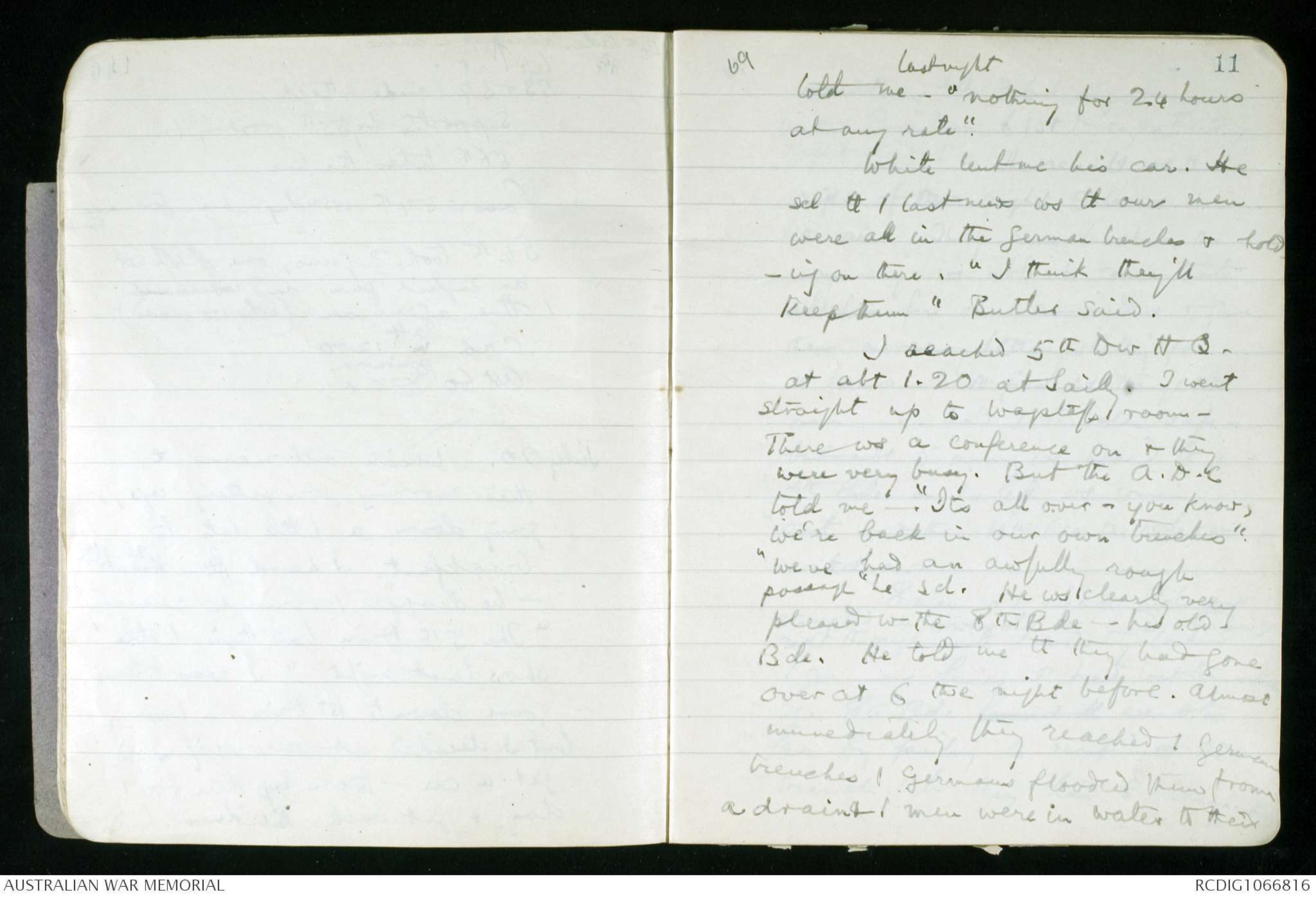
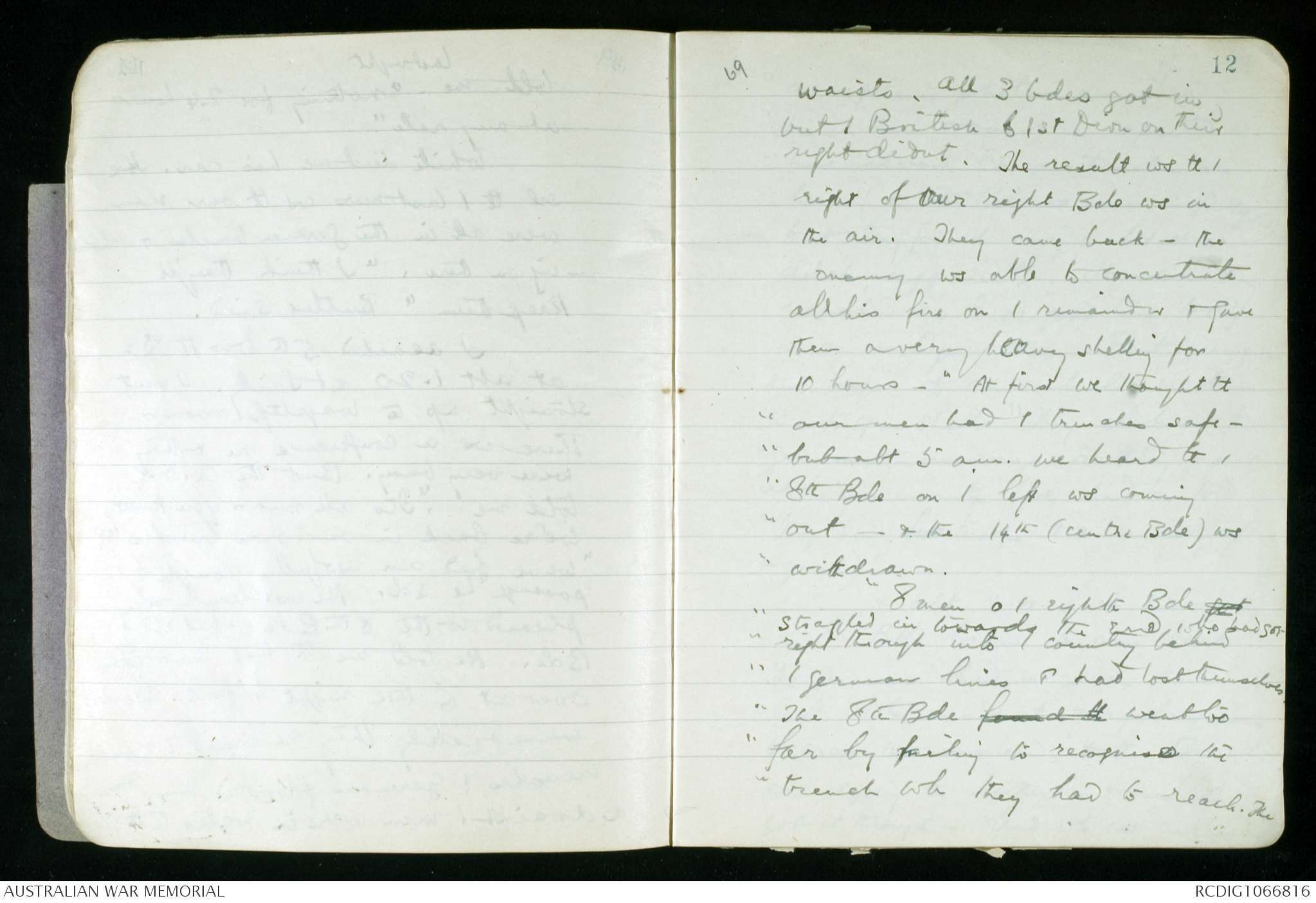
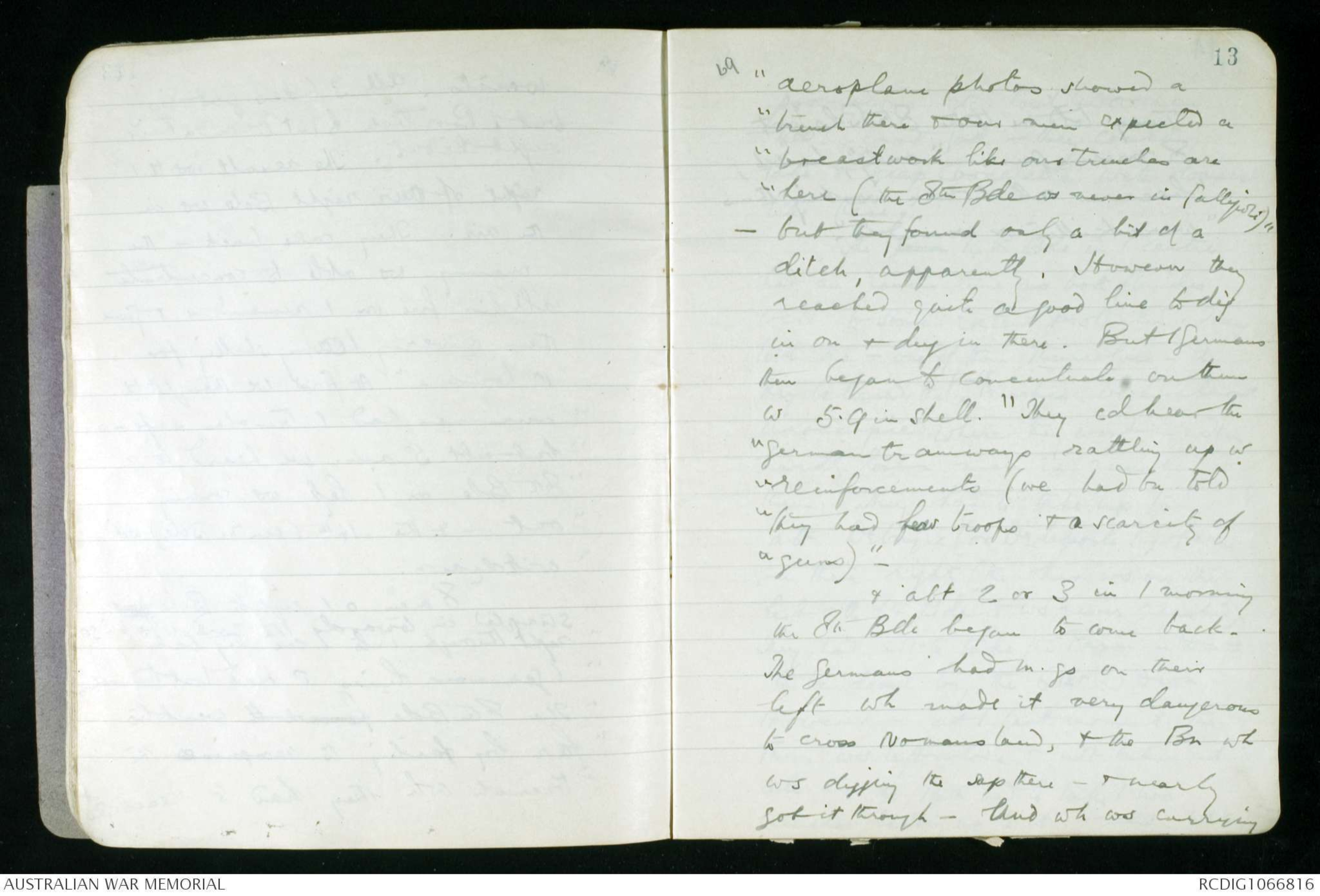
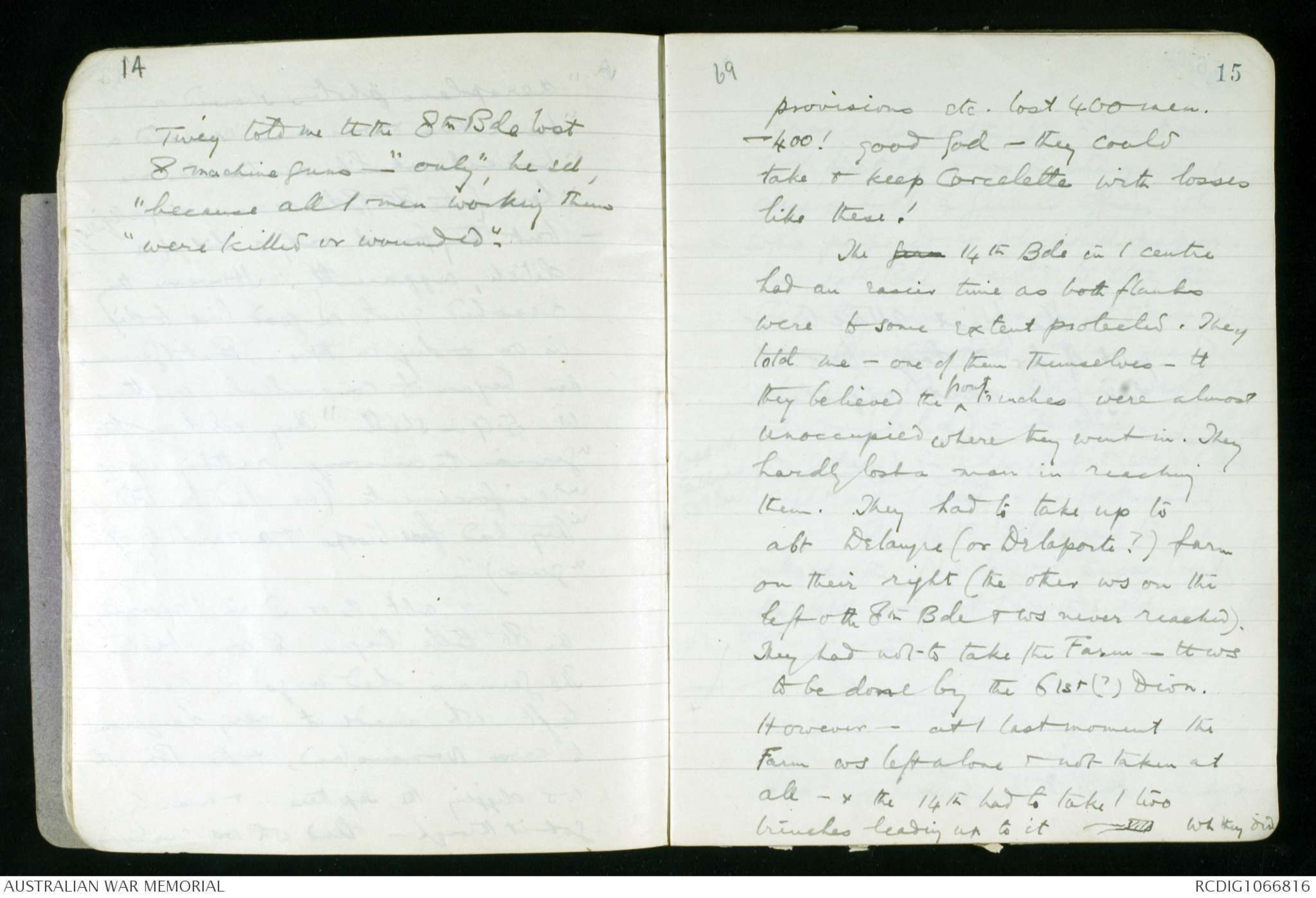
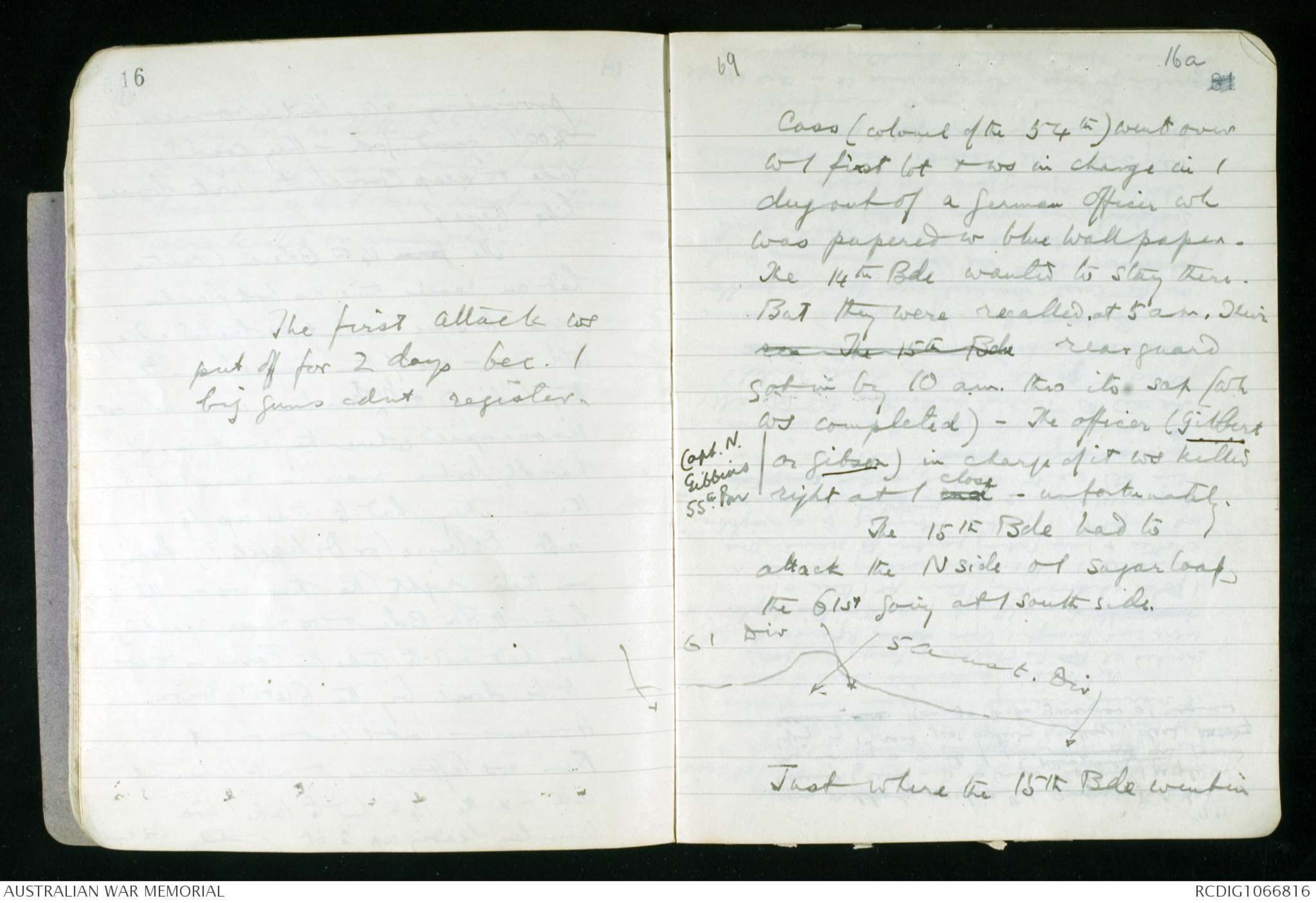
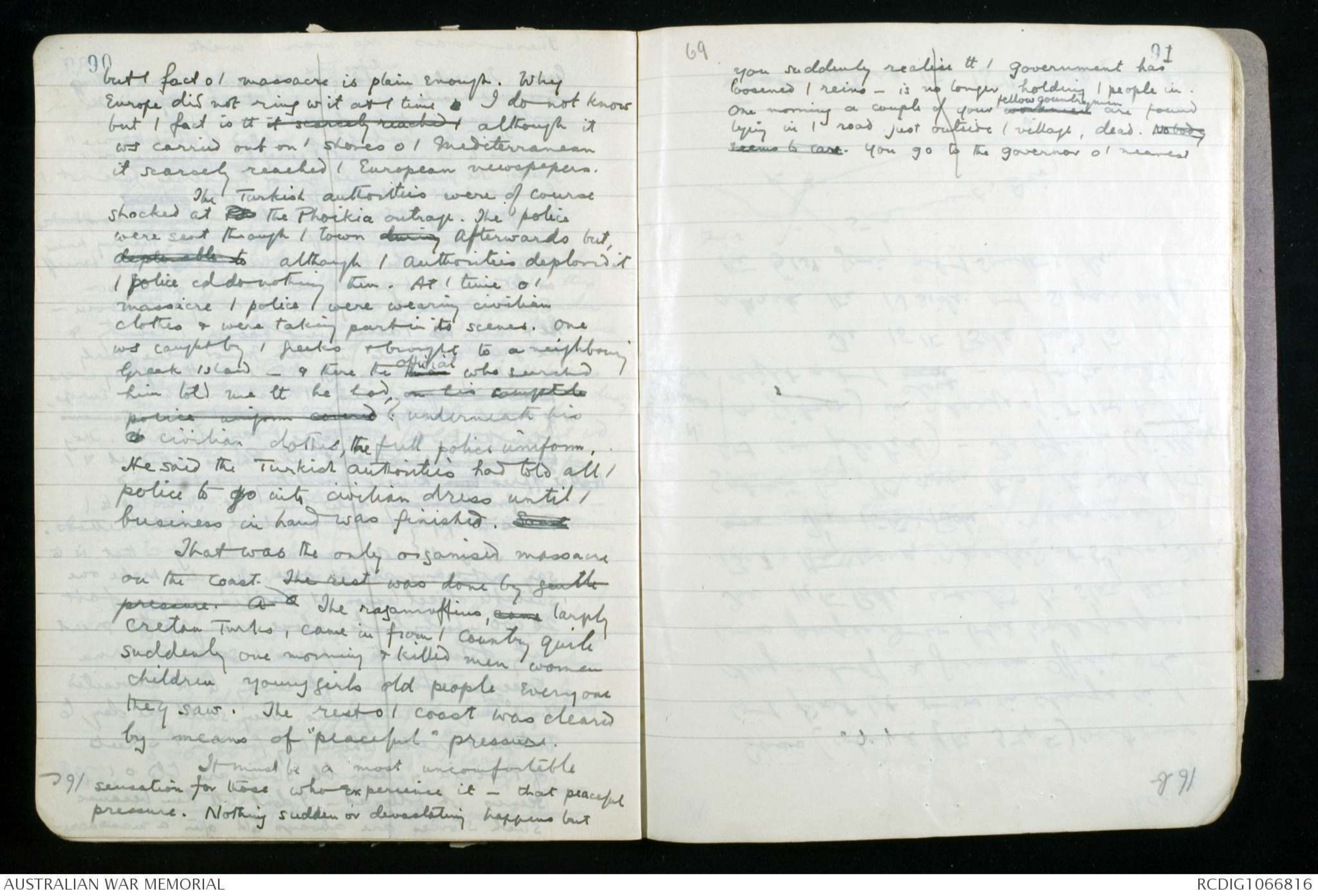
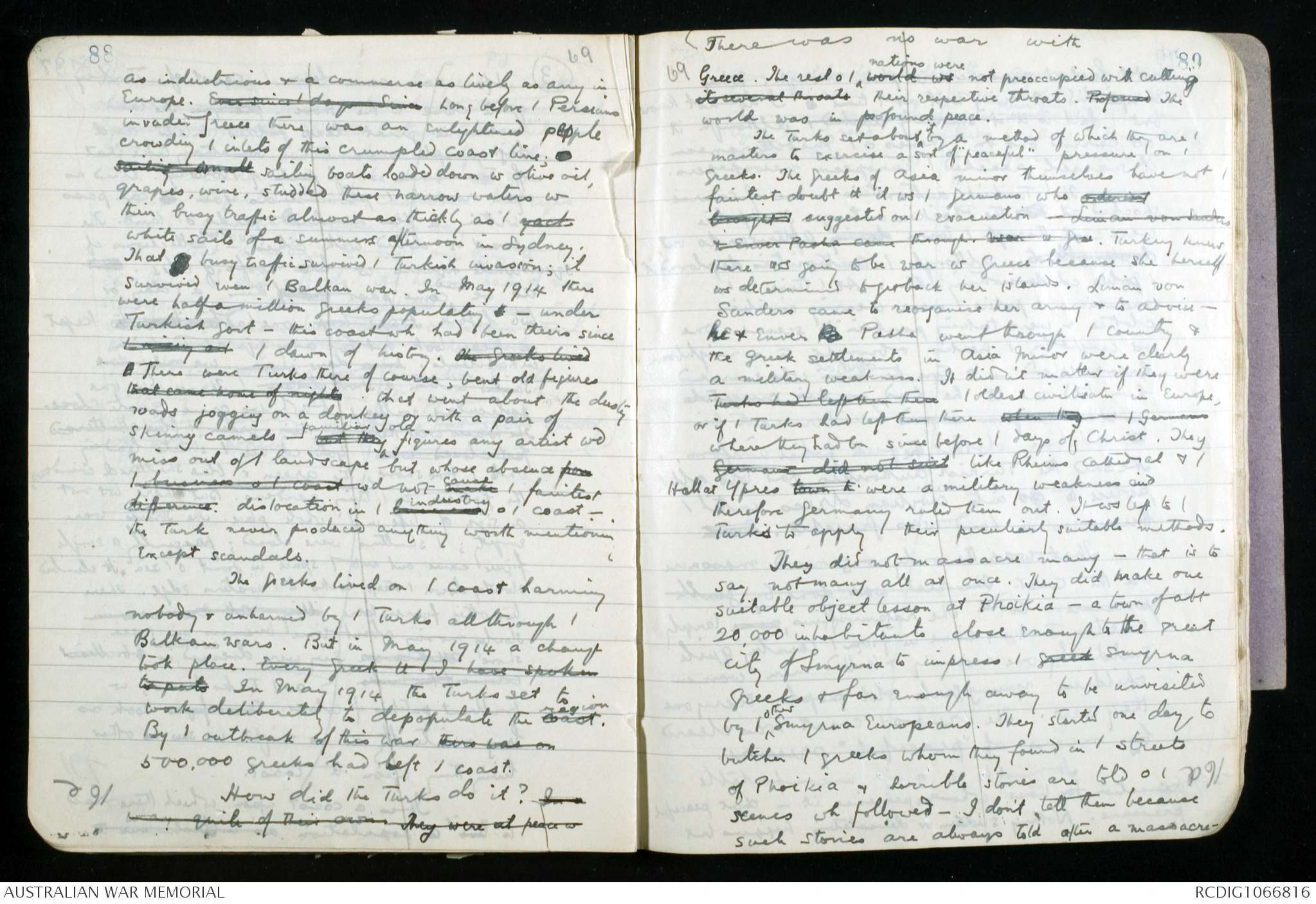
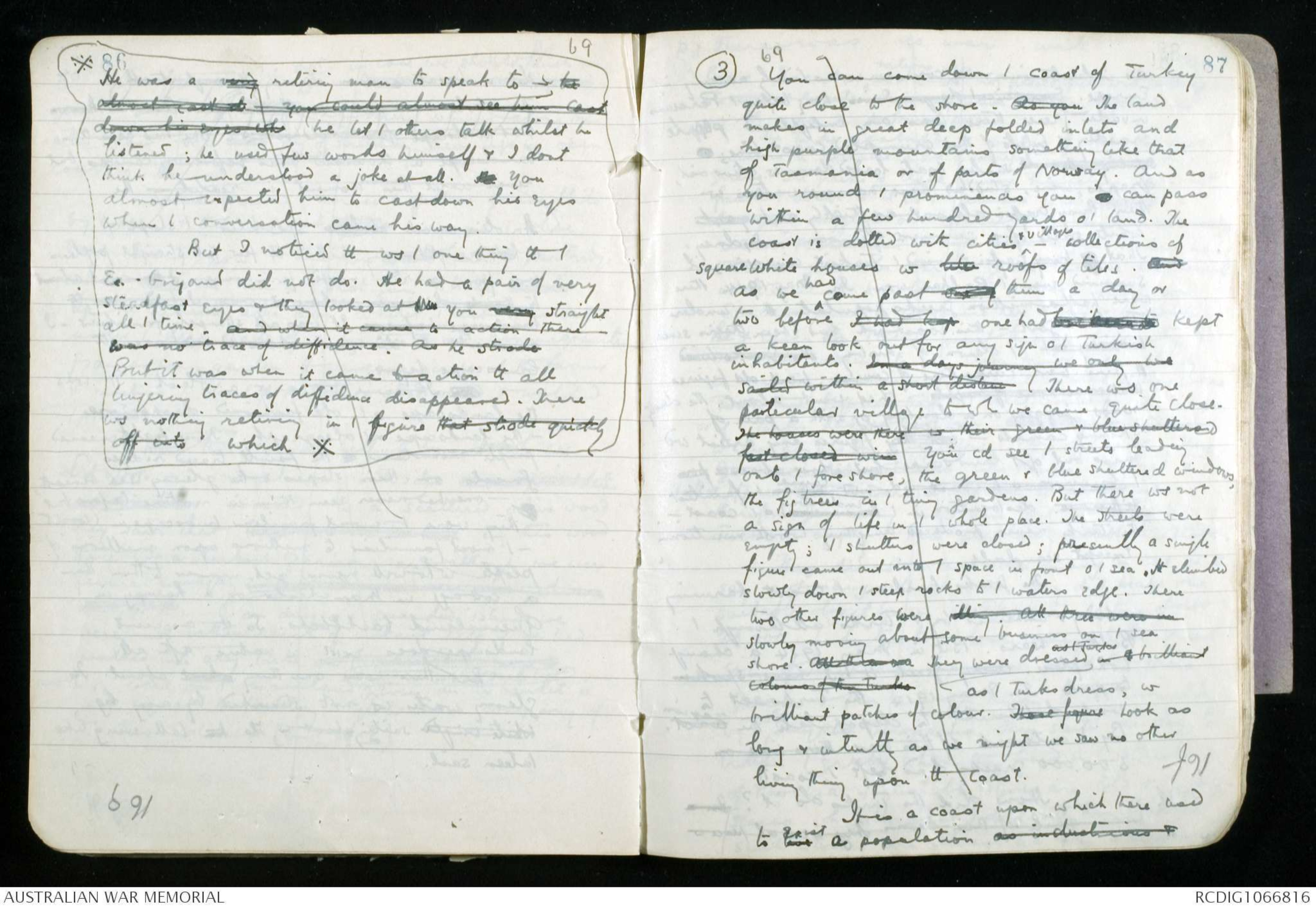
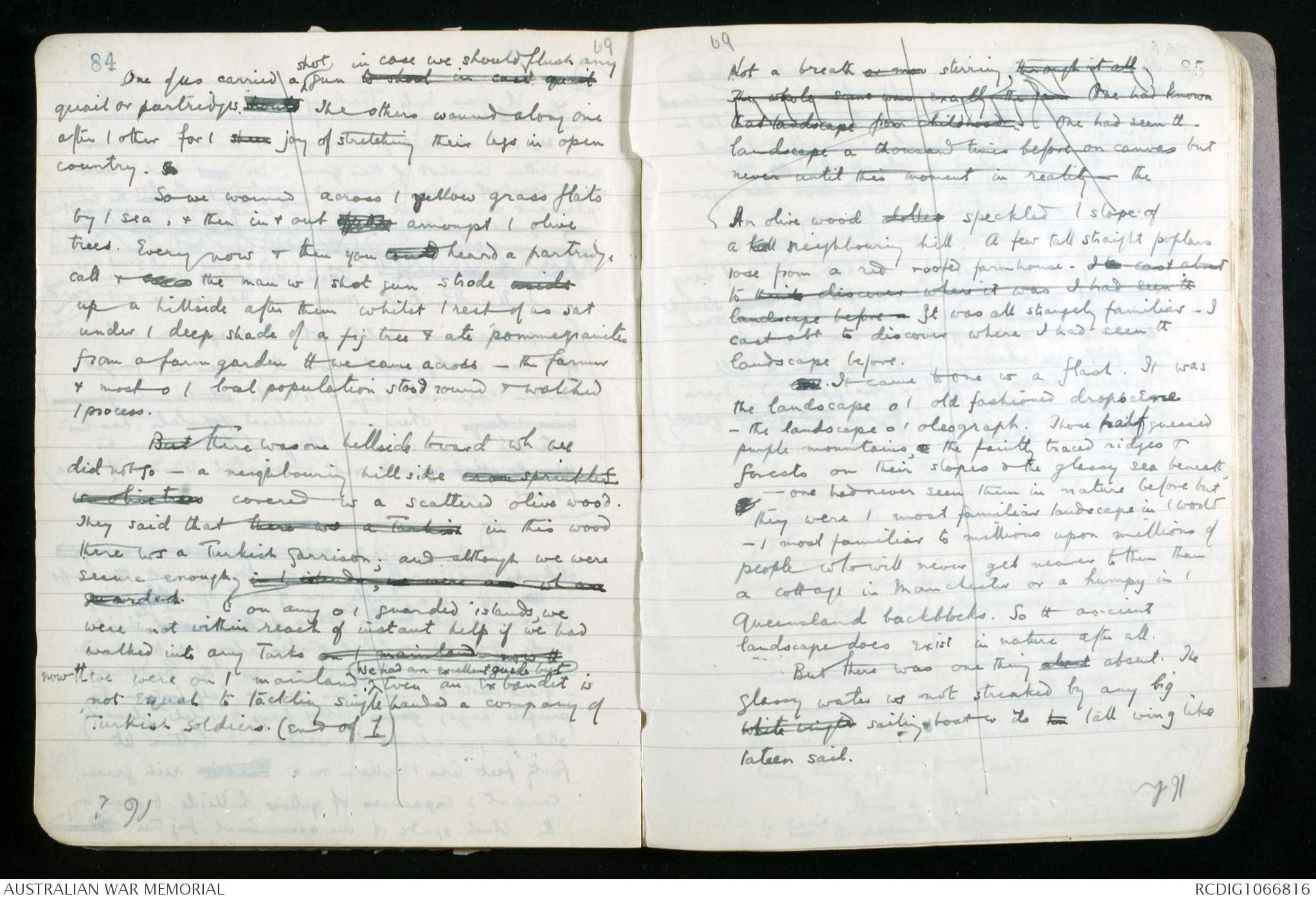
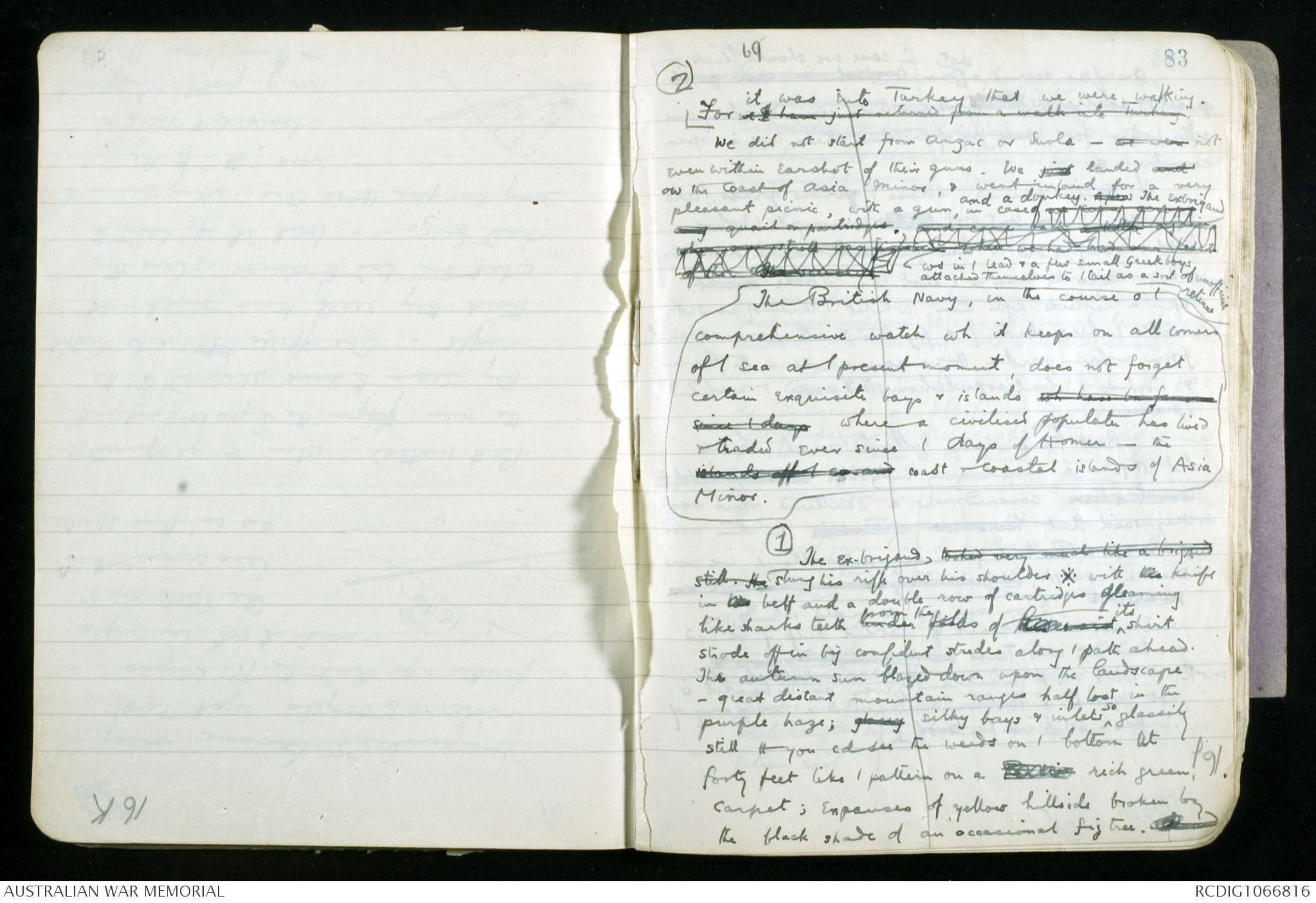
69 11
told me last night "nothing for 24 hours
at any rate".
White lent me his car. He
sd tt / last news ws tt our men
were all in the German trenches & holding
on there. "I think they'll
keep them" Butler said.
I reached 5th Div HQ.
at abt 1.20 at Sailly. I went
straight up to Wagstaffs room -
There ws a conference on & they
were very busy. But the A.D.C.
told me -. "Its all over - you know,
we're back in our own trenches".
"Weve had an awfully rough
passage" he sd. He was clearly very
pleased w the 8th Bde - his old
Bde. He told me tt they had gone
over at 6 the night before. Almost
immediately they reached / German
trenches / Germans flooded them from
a drain & / men were in water to their
69 12
waists. All 3 bdes got in
but / British 61st Divn on their
right didnt. The result was tt /
right of our right Bde ws in
the air. They came back - the
enemy ws able to concentrate
all his fire on / remainder & gave
them a very heavy shelling for
10 hours – "At first we thought tt
"our men had / trenches safe -
"but abt 5 am. we heard tt /
"8th Bde on / left ws coming
"out - & the 14th (centre Bde) ws
"withdrawn.
"8 men o / eighth Bde got
"straggled in towards the end who had got
"right through into / country behind
"/ German lines & had lost themselves.
"The 8th Bde found tt went too
"far by failing to recognise the
"trench wh they had to reach. The
69 13
“aeroplane photos showed a
"trench there & our men expected a
"breastwork like our trenches are
"here (the 8th Bde was never in Gallipoli)"
- but they found only a bit of a
ditch, apparently. However they
reached quite a good line to dig
in on & dug in there. But / Germans
then began to concentrate on them
w 5.9 in shell. "They cd hear the
"German tramways rattling up w
"reinforcements (we had bn told
"they had few troops & a scarcity of
"guns)" -
& abt 2 or 3 in / morning
the 8th Bde began to come back.
The Germans had m.gs on their
left wh made it very dangerous
to cross No mans land, & the Bn wh
ws digging the sap there - & nearly
got it through - And wh was carrying
14
Tirney told me tt the 8thBde lost
8 machine guns - "only", he sd,
"because all / men working them
'were killed or wounded".
69 15
provisions etc. lost 400 men.
- 400! good God - they could
take & keep Corcelette with losses
like these!
The Germ 14th Bde in / centre
had an easier time as both flanks
were to some extent protected. They
told me - one of them themselves - tt
they believed the front trenches were almost
unoccupied where they went in. They
hardly lost a man in reaching
them. They had to take up to
abt Delangre (or Delaporte?) farm
on their right (the other ws on the
left of the 8th Bde & ws never reached).
They had not to take the Farm - tt ws
to be done by the 61st (?) Divn.
However - at / last moment the
Farm ws left alone & not taken at
all - & the 14th had to take / two
trenches leading up to it wh they did.
16
The first attack ws
put off for 2 days bec. /
big guns cdnt register.
69 16a 81
Cass (colonel of the 54th) went over
w / first lot & ws in charge in /
dugout of a German Officer wh
was papered w blue Wallpaper.
The 14th Bde wanted to stay there.
But they were recalled at 5am, theirrem the 15th Bde rearguard
got in by 10a.m. thus its sap (wh
ws completed) - The officer (Gilbert
[*Capt. N. Gibbons 55th Bn*]
or Gibson in charge of it ws killed
right at / end close - unfortunately.
The 15th Bde had to
attack the N side of sugar loaf
the 61st going at / South side.
Just where the 15th Bde went in
90
but / fact of / massacre is plain enough. Why
Europe did not ring w it at / time x I do not know
but / fact is tt it scarcely reached / although it
ws carried out on / shores o / Mediterranean
it scarcely reached / European newspapers.
The Turkish authorities were of course
shocked at Pxx the Phoikia outrage. The police
were sent through / town during afterwards but,deplorable to although / authorities deplored it
/ police cd do nothing then. At / time o /
massacre / police were wearing civilian
clothes & were taking part in its scenes. One
ws caught by / Greeks & brought to a neighbouring
Greek Island - & there the official xxxx who searched
him told me tt he had, on his completepolice uniform covered underneath his xx civilian clothes, the full police uniform.
He said the Turkish authorities had told all /
police to go into civilian dress until /
business in hand was finished. Some
That was the only organised massacre
on the coast. The rest was done by gentlepressure. A The ragamuffins, came largely
Cretan Turks, came in from / country quite
suddenly one morning & killed men women
children young girls old people everyone
they saw. The rest o / coast was cleared
by means of "peaceful" pressure.
It must be a most uncomfortable
[*16c*] sensation for those who experience it - that peaceful
pressure. Nothing sudden or devastating happens but
69 91
you suddenly realise tt / government has
loosened / reins - is no longer holding / people in.
One morning a couple of your fellow workmen countrymen are found
lying in / road just outside / village, dead. Nobodyseems to care. You go to the governor o / nearest
[* 16b*]
88 69
as industrious & a commerce as lively as any in
Europe. Ever since / days Since Long before / Persians
invaded Greece there was an enlightened people
crowding / inlets of this crumpled coast line; xsailing small sailing boats loaded down w olive oil,
grapes, wine, studded these narrow waters w
their busy traffic almost as thickly as / yach
white sails of a summers afternoon in Sydney.
That x busy traffic survived / Turkish invasion; it
survived even / Balkan war. In May 1914 there
were half a million Greeks populating x - under
Turkish govt - this coast wh had been theirs since / xxxing xxx / dawn of history. The Greeks livedx There were Turks there of course, bent old figuresthat came home of nights that went about the dusty
roads jogging on a donkey or with a pair of
skinny camels - but they familiar old figures any artist wd
miss out of / landscape but whose absence fromthe business of / coast wd not make cause / faintestdifference. dislocation in / business industry o / coast. -
The Turk never produced anything worth mentioning
except scandals.
The Greeks lived on / coast harming
nobody & unharmed by / Turks all through /
Balkan wars. But in May 1914 a change
took place. Every Greek tt I have spokento puts In May 1914 the Turks set to
work deliberately to depopulate the coast region.
By / outbreak of this war there was on
500,000 Greeks had left / coast.
[*16e*] How did the Turks do it? In away quite of their own They were at peace w
There was no war with
69 Greece. The rest o / nations were world ws not preoccupied with cutting 89its several throats their respective throats. Profound The
world was in profound peace.
The Turks set about it by a method of which thy are /
masters to exercise a sort of "peaceful" pressure on /
Greeks. The Greeks of Asia minor themselves have not /
faintest doubt tt it ws / Germans who orderedbrought suggested on / evacuation Liman von Sanders & Enver Pasha came through. War w Gre Turkey knew
there ws going to be war w Greece because she herself
ws determined to get back her island. Liman von
Sanders came to reorganise her army & to advise -
He & Enver P Pasha went through / country &
the Greek settlements in Asia Minor were clearly
a military weakness. It didn't matter if they wereTurks had left them there / oldest civilisation in Europe,
or if / Turks had left them there when they / Germans
where they had bn since before / days of Christ. TheyGermans did not suit like Rheims cathedral & /
Hall at Ypres town to were a military weakness and
therefore Germany ruled them out. It ws left to /
Turks to apply their peculiarly suitable methods.
They did not massacre many - that is to
say not many all at once. They did make one
suitable object lesson at Phoikia - a town of abt
20,000 inhabitants close enough to the great
city of Smyrna to impress / greed smyrna
Greeks & far enough away to be unvisited
by / other Smyrna Europeans. They started one day to
butcher / Greeks whom they found in / streets
of Phoikia & horrible stories are told o / [*16d*]
scenes wh followed - I don't tell them because
such stories are always told after a massacre -
X 86 69
He was a very retiring man to speak to healmost cast it you could almost see him castdown his eyes whe he let / others talk whilst he
listened; he used few words himself & I dont
think he understood a joke at all. He You
almost expected him to cast down his eyes
when / conversation came his way.
But I noticed th ws / one thing tt /
Ex - brigand did not do. He had a pair of very
steadfast eyes & they looked at xx you very straight
all / time. and when it came to action therewas no trace of diffidence. As he strode
But it was when it came to action tt all
lingering traces of diffidence disappeared. There
ws nothing retiring in / figure that strode quicklyoff into which X
[*16g*]
(3) 69 87
You can come down / coast of Turkey
quite close to the shore. As you The land
makes in great deep folded inlets and
high purple mountains something like that
of Tasmania or of parts of Norway. And as
you round / prominences you a can pass
within a few hundred yards o / land. The
coast is dotted with cities & villages - collections of
square white houses w like roofs of tiles. And
as we had come past one of them a day or
two before I had hap one had but keen to kept
a keen look out for any sign of Turkish
inhabitants. In a days journey we only hadsails within a short distance There ws one
particular village to wh we came quite close.The houses were there w their green & blue shutters andfast closed win You cd see / streets leading
onto / fore shore, the green & blue shuttered windows.
the fig trees in / tiny gardens. But there ws not
a sign of life in / whole place. The streets were
empty; / shutters were closed; presently a single
figure came out into / space in front o / sea. It climbed
slowly down / steep rocks to / waters edge. There
two other figures were sitting. All three were in
slowly moving about some business on / sea
shore. All o them wer They were dressed, as / Turks ^as / Turks in brilliantcolours of the Turks. as / Turks dress w
brilliant patches of colour. These figure Look as
long & intently as we might we saw no other
living thing upon tt Coast. [*16f*]
It is a coast upon which there used
to live exist a population as industrious &
84 69
One of us carried a shot gun to shoot in case quail in case we should flush any
quail or partridges. shouts The others wound along one
after / other for / sheer joy of stretching their legs in open
country. So
So we wound across / yellow grass flats
by / sea, & then in & out of olive amongst / olive
trees. Every now & then you could heard a partridge
call & occas the man w / shot gun strode aside
up a hillside after them whilst / rest of us sat
under / deep shade of a fig tree & ate pommegranites
from a farm garden tt we came across - the farmer
& most o / local population stood round & watched
/ process.But There was one hillside toward wh we
did not go - a neighbouring hill side xxxx sprinkedw olive trees covered w a scattered olive wood.
They said that here ws a Turkish in this wood
there ws a Turkish garrison; and although we were
secure enough on any o / guarded islands, we in / islands, we were xx wh wereguarded
were not within reach of instant help if we had
walked into any Turks on / mainland now tt
now tt we were on / mainland. We had an excellent guide but even an ex bandit is
not equal to tackling single handed a company of
Turkish soldiers. (End of 1)
[*16i*]
69
Not a breath or man stirring. through it all 85The whole scene was exactly the same. One had knownthat landscape from childhood. One had seen ttlandscape a thousand times before on canvas butnever until this moment in reality the
An olive wood shelter speckled / slope of
a tall neighbouring hill. A few tall straight poplars
rose from a red roofed farmhouse. I tr cast aboutto think discover where it was I had seen ttlandcape before It was all strangely familiar - I
cast abt to discover where I had seen tt
landscape before.xx It came to one w a flash. It was
the landscape o / old fashioned dropscene
- the landscape o / oleograph. Those half guessed
purple mountains, & the faintly traced ridges &
forests on their slopes & the glassy sea beneath,
- one had never seen them in nature before butx they were / most familiar landscape in / world
- / most familiar to millions upon millions of
people who will never get nearer to them than
a cottage in Manchester or a humpy in /
Queensland backblocks. So tt ancient
landscape does exist in nature after all.
But there was one thing about absent. The
glassy water ws not streaked by any bigwhite winged sailing boat w its xx tall wing like
lateen sail.
[*16h*]
[*16k*]
69 83
(2)
For we I have just returned from a walk into Turkey
^it was into Turkey that we were walking.
We did not start from Anzac or Suvla - we were not
even within earshot of their guns. We just landed and
on the coast of Asia Minor, & went inland for a very
pleasant picnic, with a gun, and a donkey in case of A fear The exbrigand →any quail or patridges and came back xxxxx againwhen our stroll was finished where we had had our feastof the xxxxx
← ws in / lead & a few small Greek boys
attached themselves to / tail as a sort of unofficial retinue
The British Navy, in the course o /
comprehensive watch wh it keeps on all comers
of / sea at / present moment, does not forget
certain exquisite bays & islands wh have been famoussince / days where a civilised population has lived
& traded ever since / days of Homer - theislands off / can and coast & coastal islands of Asia
Minor.
(1)
The ex-brigand looked very much like a brigandstill. He slung his rifle over his shoulder X with his knife
in his belt and a double row of cartridges gleaming
like sharks teeth under folds from the folds of its his waist shirt
strode off in big confident strides along / path ahead.
The autumn sun blazed down upon the landscape
- great distant mountain ranges half lost in the
purple haze; glassy silky bays & inlets so glassily
still tt you cd see the weeds on / bottom at
forty feet like / pattern on a xxxxx rich green, [*16j*]
carpet; expanses of yellow hillside broken by
the black shade of an occasional fig tree. xx and
 Jacqueline Kennedy
Jacqueline KennedyThis transcription item is now locked to you for editing. To release the lock either Save your changes or Cancel.
This lock will be automatically released after 60 minutes of inactivity.